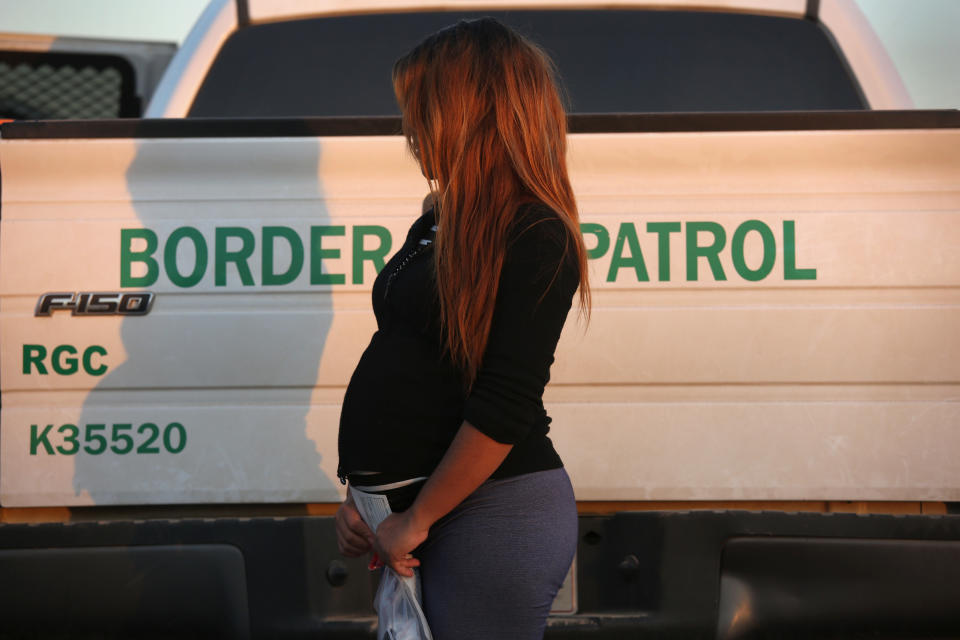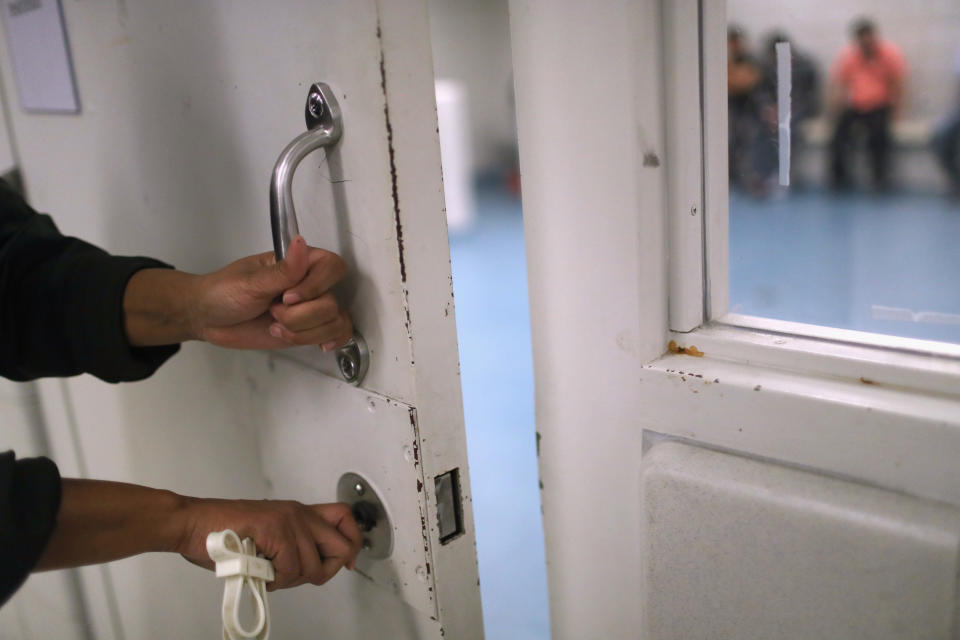Congress passed a mixed-bag of immigration policy while Trump was focused on the wall

After months of back and forth negotiations, the congressional compromise that ultimately averted yet another government shutdown last week was immediately overshadowed by President Trump’s declaration of a national emergency on Friday to unlock additional funding for the construction of a border wall.
Trump wasn’t the only one disappointed by the spending deal, which allocated $1.4 billion for the construction of new barriers along the border and provided funds to U.S. Immigration and Customs Enforcement to increase immigration detention capacity to record levels.
In negotiations with congressional Republicans and the White House, Democrats unsuccessfully sought to impose a limit on the number of detention beds.
“Unfortunately, we were unable to reach agreement on how to prevent [the Office of Management and Budget] from giving ICE a blank check for detention beds during continuing resolutions, and we were unable to effectively prevent DHS abuse of its transfer authority to increase detention beds,” Democratic Rep. Lucille Roybal-Allard of California reported before the vote.
Roybal-Allard, chairwoman of the Homeland Security Appropriations Subcommittee and a member of the House-Senate Conference Committee on Homeland Security, said that negotiations over funding for the Department of Homeland Security were “among the hardest I have experienced to date.”
Still, she argued, “although we did not win every battle, we won many,” pointing to a number of measures within the 1,169-page spending bill that are now being debated in public.
In addition to imposing various limits on where and how new border barriers can be constructed, the legislation includes several provisions intended to restrain the administration’s harsh immigration enforcement tactics. Among them is a specific appropriation to increase the frequency of inspections at immigration detention facilities, many of which have been reported to harbor unsanitary conditions, poor treatment and even abuse of detainees.
One measure prevents funds from being used to block members of Congress from inspecting DHS facilities where children are held or “to make any temporary modification at any such facility that in any way alters what is observed by a visiting member of Congress.” Over the summer, prompted by news of the Trump administration’s family separation policy, several members of Congress reportedly were refused entry when they attempted to visit various facilities housing immigrant children in government custody. Those particular facilities would not be covered by this provision, as they are run by the Department of Health and Human Services’ Office of Refugee Resettlement. However, both the family separation issue and the more recent deaths of two young migrant children detained by U.S. Customs and Border Protection have raised concerns about the conditions and care of minors held at border processing centers and family detention facilities run by DHS.
Another provision states that “no funds made available by this act may be used to destroy any document, recording, or other record pertaining to any potential sexual assault or abuse perpetrated against any individual held in the custody of the Department of Homeland Security.” The legislation also includes new requirements for ICE to publicly report statistics on the detained immigrant population, including a daily accounting of numbers in custody and where and how they were detained.
Another provision limits the use of restraints on pregnant women in ICE custody. ICE’s treatment of pregnant detainees under President Trump has been a concern of immigration advocates since former acting ICE director Thomas Homan issued guidance in December 2017 effectively undoing an Obama-era policy that generally advised against the detention of pregnant women. Exactly a year later, the agency confirmed that it was considering changing the standards for immigration detention facilities that would include eliminating restrictions governing how and under what conditions pregnant women may be shackled or tied down. The bill would appear to stymie those changes.

Among the Democratic wins touted by Roybal-Allard was “a provision to prevent ICE from using information from the Office of Refugee Resettlement to detain and remove sponsors of unaccompanied children.”
Last June, the Department of Homeland Security implemented a policy requiring ORR to provide ICE with names, fingerprints and other personal details — including immigration status — of potential sponsors for unaccompanied children as well as all adult members of a potential sponsor’s household. As Yahoo News reported in September, fears over how such information might be used by ICE resulted in a significant chilling effect on would-be sponsors which, by some accounts, contributed to record levels of unaccompanied children being held in ORR custody.
According to data released by ICE in December, immigration agents arrested 170 adults who came forward as potential sponsors for kids in ORR custody between early July and late November — the majority of whom were not classified as criminals.
This provision in particular has prompted backlash from groups that promote policies to reduce immigration to the United States, such as the Center for Immigration Studies. The group’s leaders have argued that such a measure could lead to the possible release of unaccompanied children into the homes of abusive or exploitative sponsors or create “an incentive for illegal aliens already here to order up kids from Central America as human shields against deportation.”
Countering that objection, the legislation specifies that the shield against arrest will not apply to any potential sponsor or household member whose background check reveals a felony conviction or pending charges related to an aggravated felony, child abuse or pornography, or other categories of serious crimes.
Immigrant rights advocates have condemned ICE’s use of ORR data to target adults — typically parents and close relatives — who offer to sponsor unaccompanied immigrant children. However, this provision and others embedded throughout the spending legislation seem to have left advocates generally unimpressed.

“Expanding immigration detention and giving the administration carte blanche to use funds to lock up women, men and children, undermines the legislative branch’s responsibility to hold the administration accountable, and betrays our country’s values,” said Mary Meg McCarthy, executive director of the National Immigrant Justice Center in a statement issued ahead of the bill’s passage last week. Like other similar organizations, the NIJC implored members of Congress to reject the bill, which provides ICE with funding for nearly 5,000 additional detention beds while failing to impose checks on the agency’s ability to reprogram funds to further expand its detention capacity.
“The U.S. Department of Homeland Security’s own Office of Inspector General (OIG) has issued multiple reports on ICE’s problematic detention practices and, moreover, the agency’s poor inspection and oversight processes,” Katharina Obser, senior policy adviser for the Migrant Rights and Justice program at the Women’s Refugee Commission, said in a statement. “This is a system that needs an overhaul, not expansion.”
Obser acknowledged that the spending bill does include funding to increase participation in Alternatives to Detention, including the now-defunct Family Case Management program for asylum seekers, which ICE terminated during Trump’s first year in office. The program claimed a 99 percent rate of success in ensuring that participants attended court appearances and ICE check-ins.
But she said the bill failed to outline how the program would be implemented and run.
“Congress understandably wants to spare the American people the pain and uncertainty of another shutdown,” said Lorella Praeli, deputy political director at the American Civil Liberties Union. “But in the members’ quest for compromise, they abdicated their responsibility to rein in DHS for its illegal and unconstitutional behavior, entering into partnership with the Trump administration to grow its detention and deportation force.”
In a thread on Twitter last week, Tom Jawetz, vice president of immigration policy at the Center for American Progress, highlighted many of the restrictions and oversight provisions embedded in the spending legislation, in particular the requirement to publish detailed data on detentions. “Since we can expect ICE to once more blow through its budget and ignore Congressional direction to reduce detention, disclosure could be key,” said Jawetz in a tweet.
Read more from Yahoo News:
Ann Coulter: ‘Lunatic’ Trump could be challenged in 2020 — from the right
As Trump administration negotiates with Taliban, some retired U.S. generals see defeat
Crackdown on opioids has its own victims: People who need them to live
As 5G war with China heats up, could a Cold War-inspired plan be the solution?



